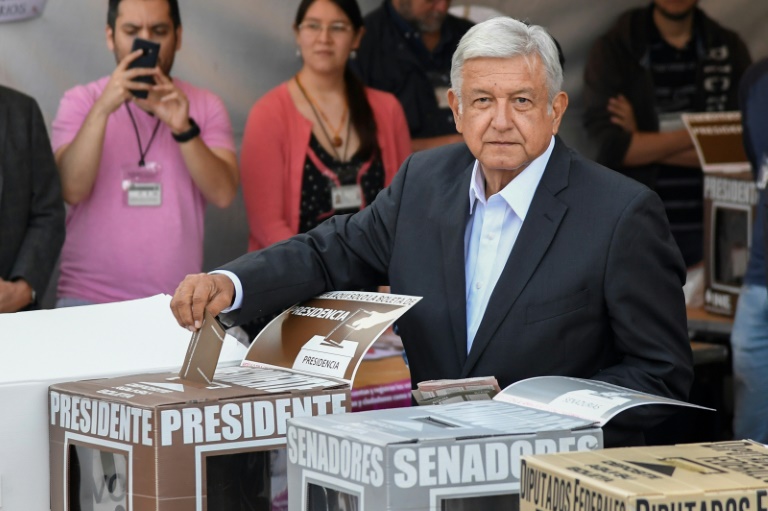
Andres Manuel Lopez Obrador casts his vote during the Mexican presidential election, in which he looks poised to sweep to power.(Photo: AFP)
Mexicans began voting Sunday in general elections marked by deep anger over endemic corruption and brutal violence, with anti-establishment leftist Andres Manuel Lopez Obrador looking poised to sweep to power.
Leading by more than 20 points in the polls, the sharp-tongued, silver-haired politician known as "AMLO" has successfully tapped voters' anger with a seemingly never-ending series of corruption scandals and horrific violence that left a record 25,000 murders last year -- an orgy of bloodshed fueled by the country's powerful drug cartels.
Lopez Obrador, who was first in line at his polling station in Mexico City's Tlalpan district, called the elections "historic."
"We represent the possibility of real change," he told hundreds of journalists crowded at the entrance.
"We are going to achieve a peaceful transformation, without violence. There is going to be an orderly but also deep change, because we are going to banish corruption, the main problem facing Mexico."
Many voters are sick of the two parties that have governed Mexico for nearly a century: the ruling Institutional Revolutionary Party (PRI) and the conservative National Action Party (PAN).
Lopez Obrador, 64, calls them both part of the same "mafia of power," a message that has resonated with many people -- even if the former Mexico City mayor has been vague on what the change he promises will look like.
Observing the huge crowd outside Lopez Obrador's polling station, 82-year-old Salvador Sanchez said the country was at a turning point.
"Everybody wants to see him. He's our new president," he told AFP.
"At last, a change. For the first time, history will be written on the side of the poor."
But Mexicans are deeply divided over the three-time presidential contender.
Gustavo Felix, 56, said he was just hoping Lopez Obrador's coalition -- led by his party, Morena -- would not win a majority in Congress.
"If they do, we're going to be living in a dictatorship," he said.
'Political shift'
The poll aggregator Oraculus gave Lopez Obrador 48.1 percent of the vote heading into the single-round election, to 26.1 percent for former speaker of Congress Ricardo Anaya of the PAN, 20.8 percent for ex-finance minister Jose Antonio Meade of the PRI and five percent for independent candidate Jaime Rodriguez.
Lopez Obrador's coalition is within striking distance of a congressional majority and six of the nine governorships up for grabs.
That would be a major shift in Mexican politics and a coup for a party launched only six years ago, originally as a grassroots movement to support Lopez Obrador's 2012 campaign, said Duncan Wood, director of the Mexico Institute at the Woodrow Wilson International Center for Scholars in Washington.
"You've got an openly left-wing economic nationalist who is from a new party, a party that didn't even exist at the last (national) election, who is managing to sweep into power, not just in the presidency, but in the Congress as well," he said.
"We're looking at a shift in Mexican politics."
Market jitters
Lopez Obrador has clashed with Mexico's business community, with some critics warning he would pursue Venezuela-style socialist policies that could wreck Latin America's second-largest economy.
Seeking to soothe, he has recruited a team of market-friendly advisers and backpedaled on his most controversial proposals, including reversing outgoing President Enrique Pena Nieto's landmark energy reform, which privatized the oil sector.
But he also promises a basic change: to govern for the poor and working-class, in a country where more than 40 percent of the population lives in poverty.
Mexico's next president faces a laundry list of challenges, including a lackluster economy and a thorny relationship with the United States under President Donald Trump, whose anti-trade, anti-immigration policies have turned diplomacy with Mexico's key trading partner into a minefield.
Besides choosing their president for the next six years, Mexico's 88 million voters are electing both houses of Congress, with a total of more than 18,000 federal, state and local posts at stake -- the largest elections in Mexican history.
They have also been the most violent, with 145 politicians murdered since September, according to the consulting firm Etellekt.
Preliminary official results are expected around 11:00 pm (0400 GMT Monday).


